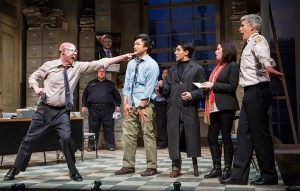oliver dennis, daniel williston, ins choi, kawa ada, raquel duffy & rick roberts
photo by cylla von tiedemann
Sitting in a darkened theatre can be a somber place. It is an increasingly rare experience that brings a community of strangers together to sit and experience the same event, without pauses to check our phones or to give in to other daily distractions. In this way, often the theatre becomes the place where we gather to cathartically cry about cancer, or to explore issues pertinent to our society, like the question of legalizing euthanasia, or our roles in the conflicts in the Middle East. In Ravi Jain’s production of Dario Fo’s Accidental Death of an Anarchist, which played until February 21st, 2015 at Soulpepper Theatre, the question arises whether it is possible for an audience to laugh and be entertained, while also engaging in critical discourse and social action at the same time. In short, must a play be either light, fun and entertaining, or deep, intellectual and “important,” or can it it be both?
Accidental Death of an Anarchist was written in 1970 and its spark of inspiration was pulled directly from the Italian headlines. On December 12, 1969 a terrorist attack occurred and three bombs were detonated, two in Rome and one at the National Agrarian Bank in Milan. An anarchist railway worker named Giuseppe Pinelli was suspected, arrested and later died while in custody from a fall from a fourth floor window of the police station. There were significant discrepancies in the police account of his death, which initially maintained that Pinelli had committed suicide by leaping of his own volition out the window during a routine interrogation. His name has since been cleared in the case. In Fo’s imagined work we are introduced to a “Madman,” a genius of improvisation, deception and impersonation, who wreaks havoc on a police station by pretending to be a Superior Court Judge coming to investigate Pinelii’s suspicious death.
This play has become a classic and often revived work of the World Theatre, but it was not intended for this conventional concept of success. The work belongs to what Fo and his partner Franca Rame refer to as “Throw Away Theatre,” a work so topical that it spoke with immediacy to the concerns of its Working Class audience, was highly improvisational and was meant to be discarded the moment it became outdated. What is so telling, and depressing, about this play is that its themes of the corruption within the Law Enforcement and Justice systems and insistences of police brutality and bias, are just as relevant today, here in Canada and elsewhere in the World, as they were in Italy in 1970. In keeping with the spirit of Fo’s “Throw Away Theatre” Jain has staged an American translation of the play by Jon Laskin and Michael Aquilante and has changed all the play’s references to reflect 2015 in Toronto- grounding it, as Fo would want, immediately in the here and now.
Kawa Ada, as a the Madman, is a breathtaking tour de force, bursting with energy and words and playful shenanigans that cascade out of him with breakneck speed and formidable urgency. Both are traps that are meticulously set to unravel the lies of Inspector Pak (Ins Choi), two Constables (Paul Sun-Hyung Lee and Daniel Williston) and the Chief of Police (Rick Roberts) and to expose the inherent Absurdity in such corruption existing at a police station in the first place. Ada’s Madman has a triumphant self-congratulatory exuberance about him that is innocent, like Peter Pan’s crowing, and with the craftiness of Bugs Bunny and mischievous charm of Arlecchino, he endears himself to the audience in his crusade for the truth, even while infuriating the exasperated Inspector Bertozzo (Oliver Dennis), who keeps trying to arrest him on prior charges of fraud.
Rick Roberts’ Chief of Police is stiff, pompous and full of formality, but is willing to do anything the Madman’s Superior Court Judge suggests in attempt to cover up any wrongdoing by himself and his Inspectors and Constables, that may have led to the death of the anarchist. The interplay between the Madman’s fake Judge, who at one point appears wearing a peg leg, a fake hand and an eyepatch, like a dismembered pirate, and Robert’s Chief, who so earnestly proves that he is so desperate to save himself he will grab hold of ANY lifeline, regardless how ridiculous it is, is hilarious. Roberts is reminiscent of Toronto’s own Police Chief, Bill Blair, whose involvement in various scandals have kept his name in the news in recent years. The play also makes reference to the allegations of police brutality during the Toronto G20 summit, the cases of Sammy Tatim, who was shot dead on a streetcar by police and Edward Snowshoe, who committed suicide in federal prison after having being segregated for 162 consecutive days, and the Mayor Rob Ford crack video scandal. Ada’s Madman conjures up Billy Flynn’s philosophy of “Razzle Dazzle,” which culminates with the Madman convincing the Inspector, Constables and a very reluctant Chief of Police to join with the audience in a rousing rendition of “Solidarity Forever.”
The farce is kicked up to Three Stooges caliber in the Second Act with the reemergence of Inspector Bertozzo threatening to blow the Madman’s cover, and the arrival of a journalist (Raquel Duffy) from a left-wing newspaper looking to expose the truth behind Pinelli’s death. Bertozzo’s desire for justice, to expose a man he knows to be a fraud, is suddenly at odds with the interests of Inspector Pak, the two Constables and the Police Chief, who need the Madman’s lies to help deceive the journalist. In this tug of war, Oliver Dennis’ Bertozzo becomes a literal punching bag, a beating down of the truth by the enforcers of the law. The journalist is easily swindled by the Madman’s eccentric stories and just as it seems as though all has been in jest- for the delight of tricks and slapstick- Kawa Ada jumps through the fourth wall and reminds us, the audience, that we are sitting and laughing at our own dismal state of affairs- that the corruption and scandal and injustice here in Toronto is real and serious. It is a jarring moment. Do we feel guilt for enjoying the last two hours of theatre? Do we wake up and engage with it in a different way? Or, do we examine how we have been using our laughter?
Dario Fo described the play as “grotesque farce about a tragic farce,” and indeed, that is exactly what Ravi Jain’s production at Soulpepper is. It is enjoyable for us to see those who are powerful in our society made to look ridiculous and for someone who is usually more vulnerable, a Madman, for example, to wield all the power. That power inversion is the very essence of satire and comedy. Yet, if we admit that the farce, although not quite so theatrical, is real, as we did when we finally voted Rob Ford out of the Mayor’s Office, we come closer to deciding that we are tired of allowing and accepting such absurdity and corruption. Then we get closer to doing something productive to change it. Laughter can be empowering and communal, and empowering the people is integral to social change. The fact that Accidental Death of an Anarchist hasn’t been able to be thrown away yet because it still resonates so strongly with the people proves that we’re still in need of a little madness to shake up our scandal-laden status quo.
Accidental Death of an Anarchist at Soulpepper Theatre is closed.







